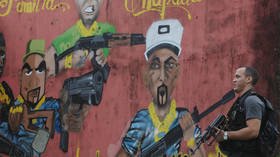‘If the govt doesn’t fix it, we will’: Brazil’s GANGS impose night-time curfews in Rio’s slums

Gangs have posted messages across the favelas in Rio de Janeiro ordering residents to respect an 8pm curfew or face the consequences. “If the government won't do the right thing, organized crime will,” reads one painted notice.
While Civil Defense sirens sound three times a day in many areas across the favelas or slums, asking residents to self-isolate, the order from local criminal gangs to stay inside at night marks the most severe effort to combat the spread of Covid-19 in the beleaguered city slums.
“Attention all residents of Rio das Pedras, Muzema and Tijuquinha! Curfew from 8pm today. Whoever is seen on the street after this time will learn to respect the next one,” one threatening message reads.
Gangs in the Rio de Janeiro favelas have enforced a lockdown from 8pm tonight. The statement reads: "If the government won't do the right thing, organised crime will" pic.twitter.com/dK0wtAR3KA
— Andrew Cesare (@AndrewCesare) March 23, 2020
“We want the best for the population. If the government does not have the capacity to fix it, organized crime will solve it,” reads another.
Brazil's government, or indeed Rio’s municipal government, has yet to impose a curfew.
Also on rt.com Brazil’s Bolsonaro says he tested NEGATIVE for Covid-19 despite reportsWhile schools, shops, and tourist hotspots like beaches have all been closed, the local population remains free to move around and socialize.
Roughly 1.5 million people live in Rio’s favelas, a ramshackle assortment of everything from small apartments to tin-roof shacks all lined by narrow, winding streets and alleyways. Poor health services and a lack of sanitation mean that, following the first officially confirmed case of Covid-19 in the favelas on Saturday, the infection is likely to spread like wildfire through the already disadvantaged area.
“The irony is that the disease was brought to Brazil by plane, by the rich, but it is among the poor that it will explode,” said Paulo Buss, director of the Center for International Relations at Fiocruz, a public health research center.
Also on rt.com The good, the bad and the ugly: How politicians and celebrities are turning a pandemic into a fashion paradeThe instructions given by health experts across the world to wash your hands and practice social distancing are rather difficult in such an extremely densely populated area, one which often lacks running water. Homes throughout the favelas often have few windows, reducing air circulation and limiting sunlight exposure, creating the perfect storm for respiratory diseases like Covid-19.
Furthermore, the favelas continue to be ravaged by tuberculosis, with infection rates almost ten times higher than the national average, highlighting the already precarious situation facing local health services.
Brazil has 1,960 confirmed cases and 34 deaths, with the state of Rio de Janeiro alone having 191 cases and three deaths so far.
Think your friends would be interested? Share this story!














